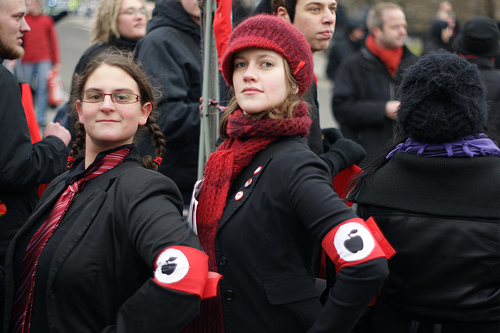I got two comments on yesterday’s post via Twitter:
https://twitter.com/AnnaGaius/status/103504033813245952
I have some more thoughts on this.
I
The strategy of exclusion, of which BDS is one example, is a tricky thing. It is effective when the excluder is (potentially) stronger than the excluded, on some dimension. International BDS is an effective strategy because it can actually hurt Israel: it can deprive Israel of services (such as a European-made tram system), entertainment, and a general feeling of legitimacy and business-as-usual. Boycotting products of the settlements within Israel is the same thing again on a smaller scale: if many in the Israeli market boycott settlement products, Israeli factories in the West Bank move back into Israel, and it’s no more business-as-usual. For a European boycott of the settlements to have an effect you would hardly need a couple percent of the European market to adhere to it. But would the EU care if the settlers decided to boycott all European products? Even if all 300-odd thousand of them strictly adhered to the boycott, it would hardly register, never mind causing some shift in EU policy.
II
Although the housing protests are the strongest thing we’ve ever seen in Israel, garnering more support than any political party could ever dream of, it would be foolish to assume that this strength is of the same kind as the EU or US’s economic and political power, which makes BDS effective. The housing protest is strong only because it has managed so far not to step on anyone’s toes too hard. In Israel, that is an astounding achievement. If a prominent part of the protest movement ((j14.org.il is just a part of the movement – it is a decentralized uprising with no real center, leadership, or hierarchy, despite what the press may say)) should pick a fight with the people of Ariel for the sake of total BDS, the movement’s strength may very well dwindle rapidly. The movement may even splinter. The movement boycotting Ariel would quickly become meaningless because not all tent cities would accept the boycott and it would suddenly just be a few isolated left-leaning groups going on about the settlements as usual.
III
When all you have is a hammer, everything looks like a nail. BDS is an impressive and important tool, but it is not the only tool, certainly not the only tool available to Israelis who have the time and energy for political activity. The housing protests have to navigate the many illogical and contradictory conceptions prevailing in Israeli societies, and despite a majority opposing the settlements (in polls, at least), it is also a mainstream idea that Ariel is practically part of Israel and here to stay. (This stems from people not bothering to look at maps [PDF] or thinking these things through. Ariel has absolutely got to go in a two-state solution.)
Total inclusiveness, even of ideological settlers, drunks and lunatics, is probably the only way this movement can survive. ((As far as I know, the only thing excluded is exclusionary messages: when extreme racist settlers showed up on Rothschild, they were eventually kicked out for having shirts reading “Tel-Aviv for Jews [only]” and other exclusionary slogans. The only thing that’s not tolerated is open intolerance.))
IV
The fact that some so-called “leaders” of the movement fail to speak out against the occupation does not mean the movement ignores the issue or enables it. Actual discussions in the tent cities often turn to the occupation, and this movement has given the Israeli left more sympathy and more people willing to listen than anything else since at least the mid-nineties. But this too is different from one tent city to another, and it’s very hard to tell what the movement as a whole thinks. I doubt the movement as a whole agrees on anything except that the cost of living and the inequalities within Israeli society are unacceptable.
V
This movement is surprisingly open to criticism. Simply finding excuses to write it off and attack all those who support it will not get your issue addressed. If you think the movement should take a stand regarding the settlements, you have to either go to its assemblies or at least write something that actually tries to convince them. As Max probably knows, it takes a lot of explaining to get typical Israelis to even begin to understand BDS. Don’t take it for granted and just attack this whole decentralized thing for not following the methods you support. Engage the people involved in action and decision-making. You might even convince j14.org.il to list settlements separately from Israel proper if you actually try.
VI
I should note that despite my disagreement with Max, I’m sick of exclusion being the only kosher leftist tactic, and will continue to consider him an all-round good guy (as I consider other opponents of the West Bank apartheid). I will also continue to follow his blog and Twitter feed and list him on this site’s list of links. (I’m doing this as a favor to myself; I know nobody really cares who I like, follow or link to.)

